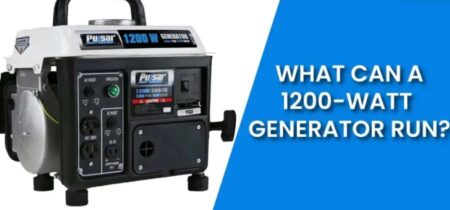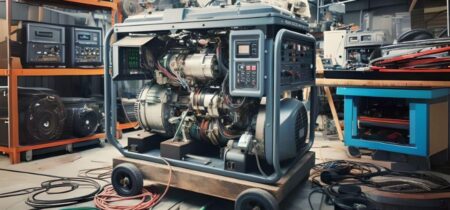
A 1200-watt portable power source is a substitute for the unavailability of electricity in camps, at construction sites, and even in times of power blackout.
The 1200-watt generator power has been one of the most preferred sizes due to the combination of effectiveness and mobility, making it suitable in different places such as camps or emergency cases at home.
A 1200-watt generator is equivalent to roughly ten amps at a hundred and twenty volts which suit the smaller appliances and gadgets. This includes everyday items like blenders (400W), slow cookers (170W), irons (1000W), and laptops (50W) Perfect for running essentials in a campsite or small campers, lighting, fan, charging devices, and small heaters.
It can accommodate appliances like ovens, televisions, phones, and fans depending on their weight. The versatility of this unit ensures that you can rely on it not only for entertainment but also during power outages at home.
What Appliances and Devices can a 1200-watt Generator Run?
Firstly, a 1200-watt generator, which equates to 10 amps at 120V and 5 amps at 240V, can run a variety of appliances. Common items include blenders (400W), slow cookers (170W), irons (1000W), laptops (50W), small fans, lights, small stoves, small space heaters, and charging devices. It’s also suitable for running essentials in a campsite or small camper. Some other devices it can run are:
- Light bulbs
- Laptop computers
- Small TV sets
- Radio
- Phone chargers
- Small fans
- Wi-Fi routers
- Inkjet printers
- Gaming consoles
- Coffee makers
- Microwave ovens (small)
- Mini refrigerators
- Slow cookers
- Hair dryers (on low setting)
- Handheld vacuums
Keep in mind, that not all of these can be run simultaneously due to the wattage limit.
How to Calculate the Power Consumption of Different Appliances and Devices
To calculate an appliance’s power consumption, you simply multiply its wattage by the number of hours it’s used. For example, a device using 100 watts over 10 hours would consume 1 kWh of energy. This calculation helps in planning the usage of your generator effectively. So, a 1000-watt iron running for one hour will consume 1 kWh of electricity.
The formula for calculating power consumption:
Power (kWh) = Wattage (W) × Hours Used (h) / 1000.
Example with a 1000-watt iron used for 1 hour:
Power (kWh) = 1000 W × 1 h / 1000 = 1 kWh.
The running time of 1200 watts is highly affected by its fuel rate, load, and model. A 1200-watt generator with a one-gallon gas tank is typically designed to last 5-6 hours on average at the 50% load, reducing the runtime as the load increases. The lifespan of a generator also depends on the brand and efficiency with which the generator is designed to operate. The brand and performance of the generator also contribute to how long it can power up.
What are the Advantages of Using a 1200-watt Generator?
There are many benefits associated with using a 1200-watt generator in different situations. Here’s a breakdown of the benefits and practical applications:
Portability: These generators are often lightweight for mobility and portability; hence, they can be easily transported like a 1200-watt generator, making outdoor camping easier.
Affordability: Generally, smaller generators like the 1200-watt type are cheaper than the bigger ones—being ideal for consumers as they demand less load.
Fuel Efficiency: A lot of 1200-watt generators especially those using diesel are rated as the most efficient. Although diesel engines on generators may be heavier and require more frequent maintenance, they tend to be more efficient, generating less carbon dioxide that meets higher emission standards compared to gas-powered engines.
Simplicity and Reliability: They have simple installations that can be easily maintained. Their spark plugs do not need changing often, and these generators are one of the most reliable machines ever.
Capability to Power Multiple Appliances: Multiple small appliances can be operated by a single 1200-watt generator simultaneously but it has restrictions. When it comes to initial watts and continuous watts it can feed into appliances including light bulbs, slow cookers, and refrigerators among others.
Automatic Voltage Regulation: This ensures that no spikes or drops in the voltage cause harm to appliances as their power is kept stable.
What are The Disadvantages of using a 1200-watt Generator?
Limited Power Capacity: Its limitation on power output is a major disadvantage. Its 1200-watt starting and 1000-watt running capacities might not be adequate for large appliances or simultaneous operation of several devices. However, this limitation may be very detrimental, particularly when there is a need for high-wattage appliances. As an example, a 1200W fridge starts with 29000W of energy but, a regular generator has to be able to start under maximum load.
Smaller Fuel Tank: Such generators are usually small with tiny fuel tanks like 0.8-gallon tanks. They require refueling severally, especially in prolonged usages which can be an inconvenience that interrupts uninterrupted production.
Lack of Certain Features: Models such as the Westinghouse iGen1200 do not come with built-in USB outlets that can be used to charge phones or tablets directly.
Lower Runtime: A 1200-watt generator can run for less time than the average competitor at a 50% load and thus this could be a factor of consideration for continuous outages as well as long events that may take place outdoors.
Environmental Concerns: When running on gasoline, the generator produces harmful air pollutants and particulate matter that adversely affect human health and the environment. This is significant for those people with a concerned about their carbon footprint.
Noise Levels: Gasoline generators of 1200 watt type are louder and especially irritating in residential areas or when doing something quiet such as camping.
Fuel Storage and Safety Concerns: Gasoline’s flammability poses storage risks. Proper containers should be stored and improper storage can pose fire or explosive hazards. Furthermore, gasoline has a limited shelf life. Using the old or dirty will harm the generator or make it run abnormally.
Conclusion
The balance between portability, affordability, and fuel efficiency comes in handy when using a 1200-watt generator to power little appliances such as cookers in situations like camping, small houses, or blackouts. It is able to support various gadgets like light bulbs, laptops, small TVs, or even kitchen appliances; however, it cannot operate large equipment as well as several devices at a time due to capacity limits.
The simplicity of design with automatic voltage regulation, although attractive, can be a limiting factor when considering power capacity, fuel tank size, and the possible effects on the environment. The 1200-watt generator could serve as an option for light power, but the restrictions should be noted.
Frequently Asked Questions
Can I run a refrigerator on a 1200-watt generator?
Yes, you can run a refrigerator on a 1200-watt generator. Ensure the generator’s wattage exceeds the fridge’s starting wattage, which typically ranges from 800 to 1200 watts. A 1200W generator can adequately power a refrigerator, especially if the starting wattage is below 1200W and the running wattage is around 200W.
Can I run my whole house on a 1200-watt generator?
Yes, a 1200-watt generator can run your whole house, provided you don’t live in a exceptionally large home. It can power all or most of your home’s appliances, offering a constant electricity supply. if your house’s total power requirements exceed 12000 watts, the generator may not be able to power everything simultaneously.
Will a 1250-watt generator run a refrigerator?
A 1250-watt generator can run a refrigerator, as long as the refrigerator’s starting wattage is less than 1250 watts. Most refrigerators require between 800 to 1200 watts to start and about 150 to 200 watts to run. So, a 1250-watt generator should be sufficient to power a typical refrigerator.
How big of a generator do I need to run my whole house?
To run your whole house on a generator, most residential homes require a 10-20kW generator. The minimum needed for basic requirements in most U.S. homes is 5,000 to 7,500 watts. It’s important to consider the wattage of all appliances and devices you need during a power outage, adding 1,000 to 2,000 watts to cover initial surges.









